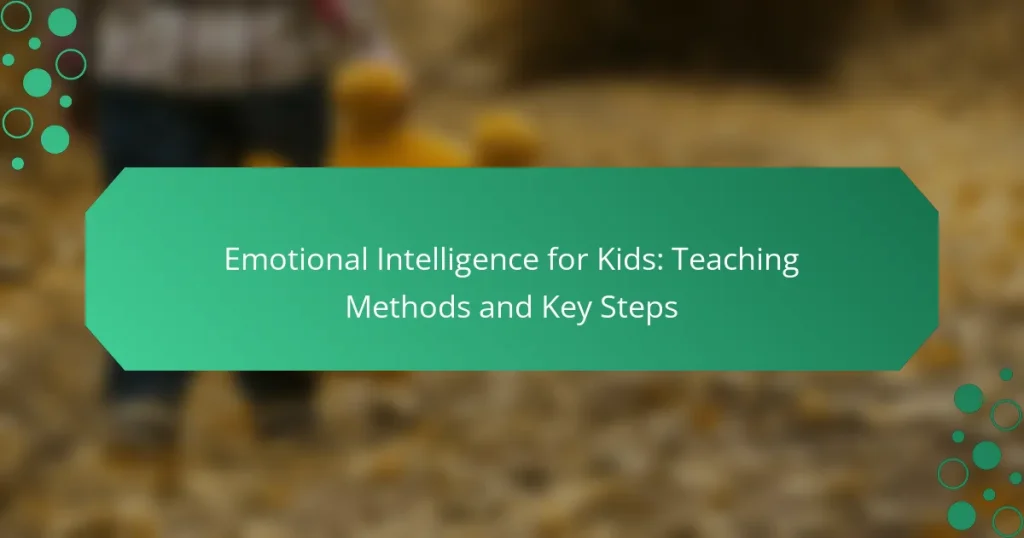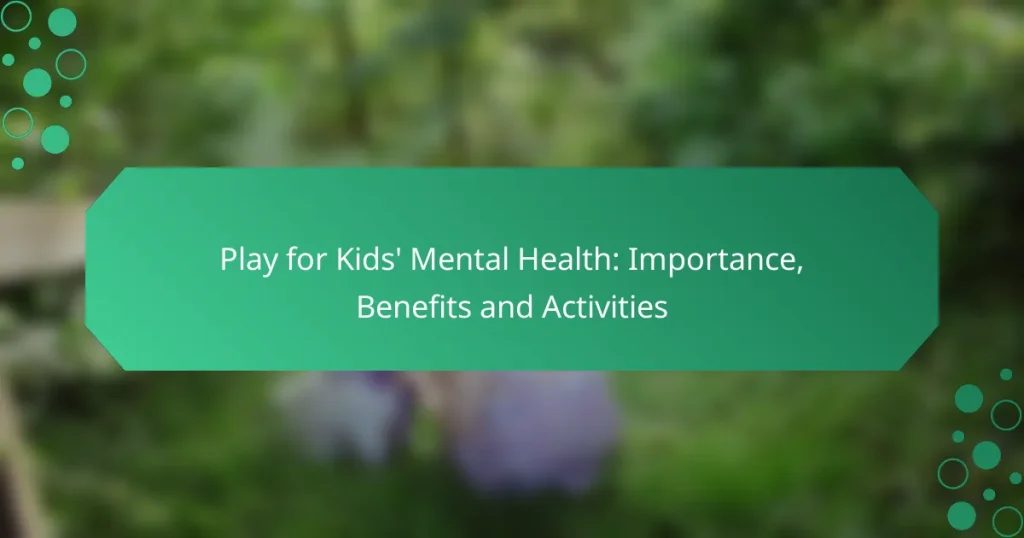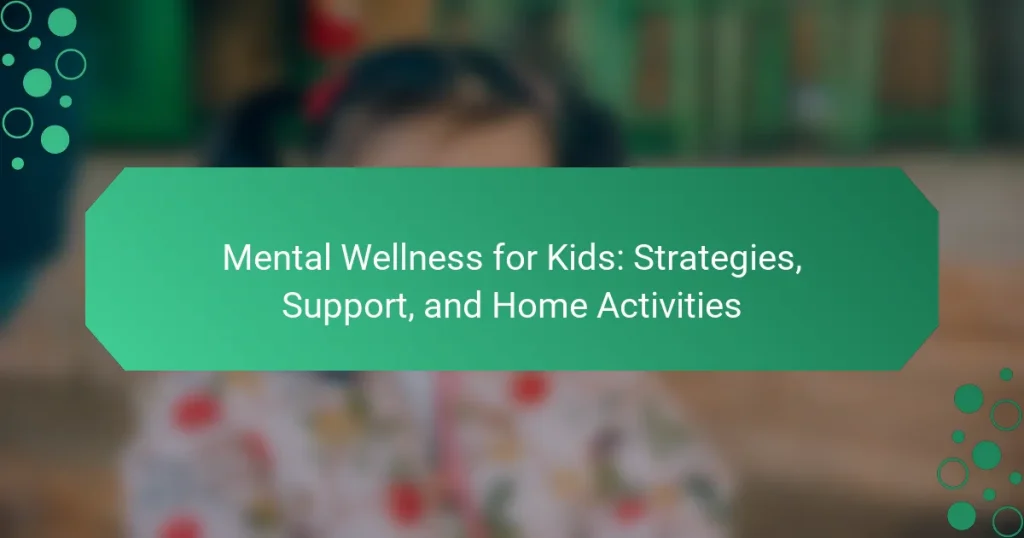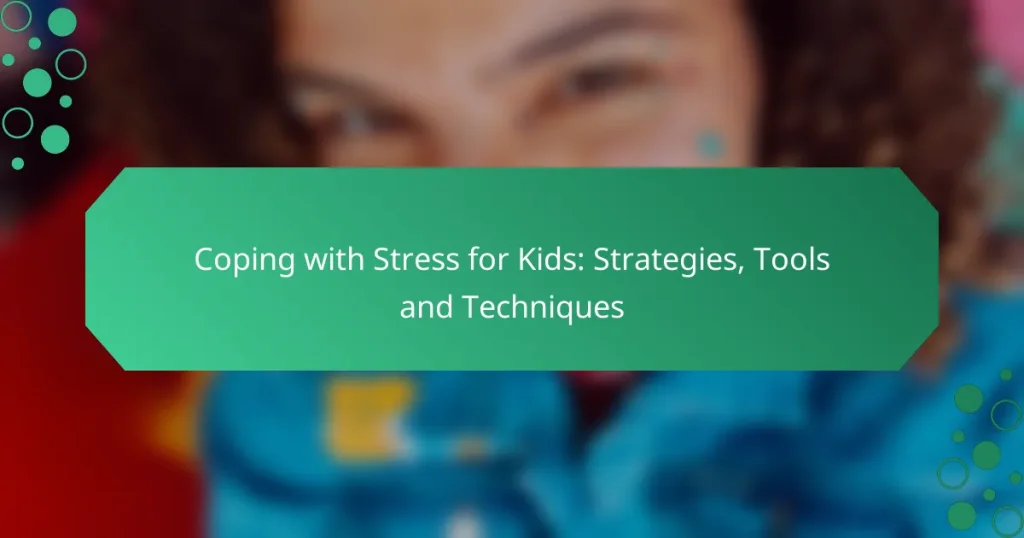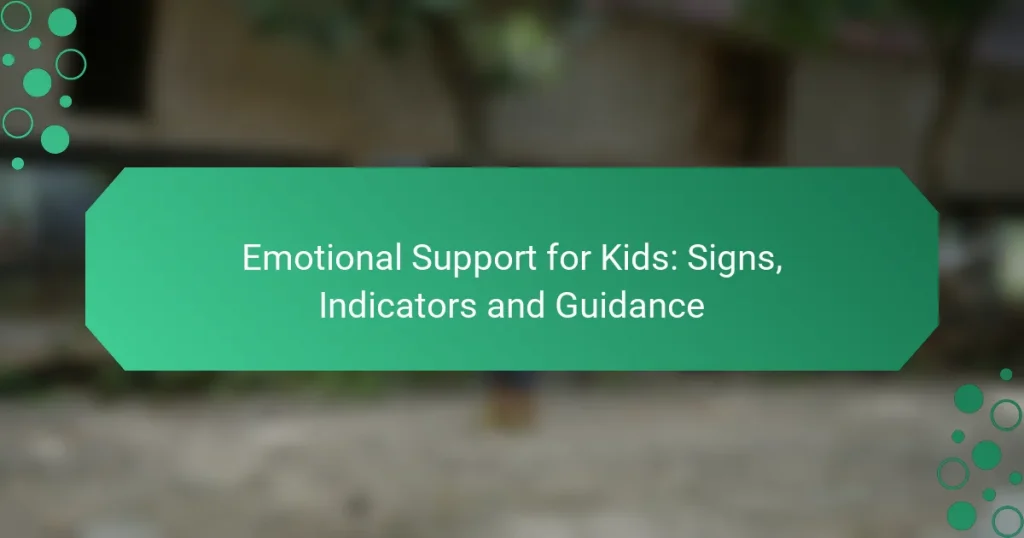Nutrition is vital for children's mental wellness, as it provides essential nutrients that support brain function and emotional stability. A balanced diet rich in fruits, vegetables, whole grains, and fermented foods can significantly enhance mood and concentration, laying the groundwork for healthy emotional development. By prioritizing nutrition, we can help children build resilience and foster positive relationships throughout their lives.
How Can Nutrition Improve Kids' Mental Wellness?
Nutrition plays a crucial role in enhancing kids' mental wellness by providing essential nutrients that support brain function and emotional stability. A well-balanced diet can lead to improved mood, better concentration, and overall mental health in children.
Balanced diets enhance cognitive function
A balanced diet that includes a variety of food groups is key to cognitive development in children. Foods rich in whole grains, fruits, vegetables, and lean proteins provide the necessary fuel for the brain to function optimally. For instance, incorporating complex carbohydrates can help maintain steady energy levels, which is essential for focus and learning.
Parents should aim to include a colorful array of fruits and vegetables in meals, as different colors often indicate different nutrients. This variety not only supports cognitive function but also encourages healthy eating habits from a young age.
Omega-3 fatty acids support brain health
Omega-3 fatty acids are vital for brain health and can significantly impact children's mental wellness. These healthy fats, found in fish like salmon, walnuts, and flaxseeds, contribute to the development of brain cells and improve cognitive functions such as memory and learning.
Including omega-3-rich foods in a child's diet can be as simple as serving fish a couple of times a week or adding ground flaxseed to smoothies or oatmeal. For families who may not consume fish regularly, omega-3 supplements can be considered after consulting with a healthcare provider.
Vitamins and minerals boost mood stability
Essential vitamins and minerals play a significant role in regulating mood and emotional health in children. Nutrients such as vitamin D, B vitamins, and magnesium are linked to improved mood and reduced anxiety levels. For example, vitamin D can be obtained through sunlight exposure and fortified foods, while B vitamins are found in whole grains and leafy greens.
To ensure children receive adequate vitamins and minerals, parents should focus on providing a diverse diet that includes fortified cereals, dairy products, and a variety of fruits and vegetables. Regular check-ups with a pediatrician can help monitor nutrient levels and address any deficiencies.
Hydration impacts concentration levels
Proper hydration is essential for maintaining concentration and cognitive performance in children. Even mild dehydration can lead to fatigue, irritability, and decreased attention span. Encouraging kids to drink water throughout the day can help keep them alert and focused.
Parents can promote hydration by making water easily accessible and offering it as the primary beverage during meals and snacks. Setting a goal for children to drink a certain amount of water daily, such as 6-8 cups, can also be a practical approach to ensure they stay hydrated.
What Role Does Emotional Health Play in Child Development?
Emotional health is crucial in child development as it affects how children think, feel, and behave. A strong foundation in emotional well-being supports their ability to cope with challenges and fosters positive relationships.
Emotional health influences academic performance
Children with good emotional health tend to perform better academically. They are more likely to engage in classroom activities, participate in discussions, and complete assignments on time. Emotional stability allows them to focus better, leading to improved grades and a more positive attitude towards learning.
For instance, children who can manage their emotions effectively often show higher levels of motivation and persistence, which are essential for academic success. Schools that incorporate social-emotional learning programs report noticeable improvements in student performance.
Healthy emotional development fosters resilience
Healthy emotional development equips children with resilience, enabling them to bounce back from setbacks. When children learn to understand and express their emotions, they develop coping strategies that help them navigate life's challenges. This resilience is vital for overcoming obstacles both in childhood and later in life.
Parents and educators can foster resilience by encouraging problem-solving skills and providing a supportive environment. Simple practices like discussing feelings and modeling positive coping mechanisms can significantly enhance a child's ability to handle stress.
Positive emotional health reduces behavioral issues
Children with positive emotional health are less likely to exhibit behavioral problems. Emotional well-being helps them regulate their actions and respond appropriately to social situations. This leads to fewer conflicts with peers and adults, creating a more harmonious environment at home and school.
To support positive behavior, caregivers should promote open communication and validate children's feelings. Setting clear expectations and providing consistent consequences can also help children understand the impact of their behavior, reducing the likelihood of issues arising.
Which Foods Are Best for Kids' Emotional Health?
Foods that support kids' emotional health include fruits, vegetables, whole grains, and fermented foods. These options provide essential nutrients that can enhance mood and stabilize energy levels, contributing to overall mental wellness.
Fruits and vegetables improve mood
Fruits and vegetables are rich in vitamins, minerals, and antioxidants that can positively affect mood. Consuming a variety of colorful produce ensures a broad spectrum of nutrients, which can help reduce feelings of anxiety and depression.
Encourage kids to eat at least five servings of fruits and vegetables daily. Simple ways to incorporate these foods include adding fruit to breakfast cereals or including vegetable sticks as snacks. Aim for a mix of raw and cooked options to maximize benefits.
Whole grains stabilize energy levels
Whole grains, such as brown rice, oats, and whole wheat bread, provide complex carbohydrates that release energy slowly. This steady energy supply helps maintain stable blood sugar levels, which can prevent mood swings and irritability in children.
Incorporate whole grains into meals by choosing whole grain pasta or bread. Aiming for at least half of all grain servings to be whole grains can support sustained energy and emotional stability throughout the day.
Fermented foods enhance gut-brain connection
Fermented foods like yogurt, kefir, and sauerkraut contain probiotics that support gut health, which is closely linked to emotional well-being. A healthy gut microbiome can influence neurotransmitter production, including serotonin, which plays a key role in mood regulation.
Introduce fermented foods gradually to kids' diets, aiming for a few servings each week. This can be as simple as adding yogurt to smoothies or including pickles as a side dish. Be mindful of sugar content in flavored yogurts to maximize health benefits.
How Can Parents Support Mental Wellness in Kids?
Parents can support mental wellness in kids by fostering a nurturing environment that encourages emotional expression and resilience. This involves active listening, creating stable routines, and promoting healthy habits that contribute to overall well-being.
Encouraging open communication
Open communication is essential for children to express their feelings and thoughts. Parents should create a safe space where kids feel comfortable sharing their emotions without fear of judgment. Regular check-ins, such as asking about their day or feelings, can help maintain this dialogue.
Using age-appropriate language and being attentive to non-verbal cues can enhance understanding. Parents might consider setting aside dedicated time each week for family discussions, which can strengthen relationships and build trust.
Establishing routines for stability
Establishing consistent routines helps provide children with a sense of security and predictability. Daily schedules for meals, homework, and bedtime can reduce anxiety and improve focus. Parents should aim for a balance between structure and flexibility to accommodate children's needs.
Incorporating family rituals, like game nights or weekend outings, can also foster connection. Keeping routines consistent, especially during transitions like moving or starting school, is crucial for maintaining emotional stability.
Promoting physical activity for stress relief
Physical activity is a powerful tool for reducing stress and improving mental health in children. Engaging in regular exercise, such as playing sports, biking, or even dancing, can boost mood and energy levels. Parents should encourage at least 60 minutes of moderate to vigorous activity most days of the week.
Outdoor play is particularly beneficial, as it combines physical activity with exposure to nature, which can enhance mood. Parents can participate in activities with their kids to model healthy habits and strengthen their bond while promoting a fun and active lifestyle.
What Are Effective Mindfulness Practices for Children?
Effective mindfulness practices for children include techniques that help them focus on the present moment, reduce stress, and enhance emotional well-being. These practices can be easily integrated into daily routines and can significantly improve mental wellness.
Breathing exercises reduce anxiety
Breathing exercises are simple yet powerful tools for children to manage anxiety. Techniques like deep belly breathing can help calm the nervous system and promote relaxation. For example, encouraging children to inhale deeply through their nose for a count of four, hold for four, and exhale through their mouth for a count of four can be effective.
Practicing these exercises for just a few minutes a day can lead to noticeable improvements in a child's ability to handle stress. Parents can guide their children to use these techniques during moments of anxiety, such as before a test or during a stressful situation.
Guided imagery fosters relaxation
Guided imagery involves using mental visualization to create calming and positive images, helping children relax and reduce stress. This practice can be initiated by reading a script or using audio recordings that lead children through a peaceful scenario, such as a beach or a forest.
To implement guided imagery, parents can set aside a quiet time where children can close their eyes and imagine themselves in a safe, happy place. This technique can be particularly beneficial before bedtime to help ease children into sleep.
Yoga improves emotional regulation
Yoga is an effective practice for enhancing emotional regulation in children. Through a combination of physical postures, breathing techniques, and mindfulness, yoga helps children connect their body and mind, promoting a sense of calm and balance. Simple poses like Child's Pose or Cat-Cow can be easily taught to young ones.
Incorporating yoga into a child's routine, even for short sessions a few times a week, can help them develop better coping strategies for managing their emotions. Parents can join in or find local classes that cater to children, making it a fun family activity.
How Can Schools Promote Mental Wellness?
Schools can promote mental wellness by creating supportive environments that prioritize emotional health and social connections. Effective strategies include implementing programs that teach students how to manage their emotions and build resilience.
Implementing social-emotional learning programs
Social-emotional learning (SEL) programs focus on developing skills such as self-awareness, self-management, social awareness, relationship skills, and responsible decision-making. These programs help students understand and manage their emotions, which is crucial for their overall mental wellness.
To implement SEL effectively, schools should integrate these programs into the existing curriculum rather than treating them as separate subjects. For instance, teachers can incorporate discussions about feelings and conflict resolution into daily lessons, allowing students to practice these skills in real-time.
Schools can also provide training for educators on how to facilitate SEL activities. This could include workshops on recognizing emotional cues in students or strategies for fostering a supportive classroom atmosphere. Regular assessments can help monitor the effectiveness of these programs and make necessary adjustments.
